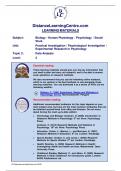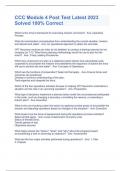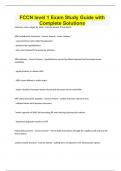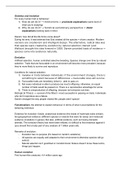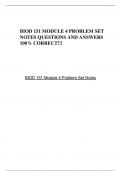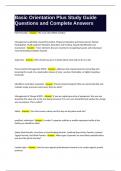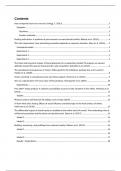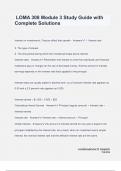LEARNING MATERIALS
Subject: Biology / Human Physiology / Psychology / Social
Work
Unit: Practical Investigation / Psychological Investigation /
Experimental Research in Psychology
Topic 3: Data Analysis
Level: 3
Essential reading:
These learning materials should give you the key information that
you need to plan and carry out research, and to be able to answer
exam questions on research methods.
We also recommend that you use the following online textbook,
which in our opinion is the best textbook to use alongside these
learning materials. You can download it as a series of PDFs via the
following weblink:
Robson, C. (1994) Experiment, Design and Statistics in
Psychology. 3rd ed. Harmondsworth: Penguin
Recommended reading:
Additional recommended textbooks for this topic depend on your
main subject area, but here are the most common textbooks that can
be obtained second-hand from eBay and Amazon. Do not worry
about having the most up-to-date edition:
• Psychology and Biology: Coolican, H. (2006) Introduction to
Research Methods in Psychology. 6th ed. Hove: Psychology
Press.
Coolican, H. (2014) Research Methods and Statistics in
Psychology. 18th ed. Hove: Psychology Press.
• Education: Cohen, L., Manion, L., and Morrison, K. (2007)
Research Methods in Education. 6th ed. London: Routledge.
• Sports Studies: Gratton, C. and Jones, I. (2009) Research
Methods for Sports Studies. 2nd ed. London: Routledge.
• Health: Bowling, A. (2009) Research Methods in Health:
Investigating health and health services. Maidenhead: Open
University Press.
• Childhood Studies: Mukherji, P., and Albon, D. (2009) Research
Methods in Early Childhood: An introductory guide. London:
SAGE Publications Ltd.
© DistanceLearningCentre.com 2022
, Further resources:
Further resources to deepen your learning on specific aspects of this
topic are listed throughout these learning materials.
Read and make notes:
Making notes turns reading into studying. Notes should be brief, clear and
helpful.
To help your understanding:
• rewrite or summarise what you have learned (avoid copying what
you have read);
• note down any questions your studying has raised, either to ask
your tutor, or to develop into further research.
To help you to remember:
• sum things up to improve long term memory;
• write things down to aid motor memory;
• use colour, images or patterns to help visual memory.
To help you in your assessments:
• record where you will find information (e.g. page numbers);
• keep your notes organised and easy to navigate;
• highlight where further reading and research are needed,
including any recommended or further reading;
• use your notes to help you get started on your TAQs.
Read the Specification:
• So that you will know the criteria you will be assessed on
please read the unit specification in my courses on the
Materials page.
© DistanceLearningCentre.com 2022
, Subject: Biology / Human Physiology / Psychology / Social Work
Unit: Practical Investigation / Psychological Investigation / Experimental Research
in Psychology
Topic 3: Data Analysis
LEARNING MATERIALS
Contents
Press CTRL/⌘ + Click in the contents list to go to the relevant page
Introduction .............................................................................................1
1. Descriptive vs inferential statistics ..................................................2
2. Descriptive statistics........................................................................4
2.1 Organising the data .....................................................................................5
2.1.1 Histograms ....................................................................................6
2.1.2 Frequency polygons ......................................................................7
2.1.3 Scatter graphs for Correlational Studies.......................................7
2.2 Measures of central tendency: mean, median and mode ..........................8
2.2.1 The mean: .....................................................................................9
2.2.2 The median: ................................................................................10
2.2.3 The mode: ...................................................................................11
2.3 Measures of dispersion .............................................................................13
2.3.1 The range ....................................................................................13
2.3.2 The variance................................................................................13
2.3.3 The standard deviation................................................................16
2.4 Levels of measurement (also known as type of data) ..............................18
2.4.1 Nominal data ...............................................................................19
2.4.2 Ordinal data .................................................................................20
2.4.3 Interval and ratio data .................................................................21
2.5 Normal distribution ....................................................................................25
2.6 Skewed distribution ...................................................................................26
3. Inferential statistics........................................................................ 27
3.1 Parametric tests and non-parametric tests ...............................................29
3.2 Choosing a statistical test .........................................................................30
3.3 Choosing a statistical test: flowchart (simple)...........................................33
3.4 Choosing a statistical test: diagram (more complex)................................34
3.5 Probability and significance levels ............................................................35
3.6 Type I and type II errors ............................................................................37
3.7 Reporting results .......................................................................................38
3.7.1 Template for reporting your findings ...........................................39
Bibliography........................................................................................... 41
Recommended reading .......................................................................... 41
Resources .............................................................................................. 41
Sources and credits ............................................................................... 42
© DistanceLearningCentre.com 2022
, Subject: Biology / Human Physiology / Psychology / Social Work
Unit: Practical Investigation / Psychological Investigation / Experimental Research
in Psychology
Topic 3: Data Analysis
LEARNING MATERIALS
Introduction
In this topic:
In this topic we will look at the ways that researchers process
their data once they have collected it. You will learn about
simple descriptive statistics (where the researcher just wants to
summarise the data and draw graphs) and inferential statistics
(where the researcher actually tests the hypothesis that is being
investigated using a specially devised test).
Keyword/s:
Empirical Data Data which can be physically seen.
Descriptive Used to summarise data and look for
statistics patterns and trends.
Measures of Ways to find the middle value in a set of
central tendency data mean, median and mode are the three
measures of central tendency.
Dispersion How the data is spread out. Measures of
dispersion include the range, the standard
deviation and variance.
Inferential These are statistics tests that are used to
statistics tests test hypotheses. The word inferential means
that we make inferences (educated guesses)
about the patterns in the data and apply
them to the population from which samples
are drawn.
Chance The extent to which something occurs
randomly.
Probability The likelihood (or chance) that certain
events will occur.
Significant A set of results are sufficiently strong for us
to accept the alternate hypothesis. .
© DistanceLearningCentre.com 2022 1

